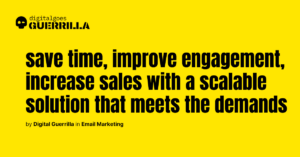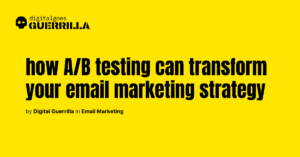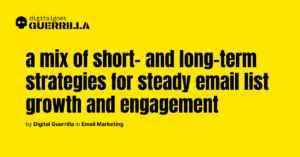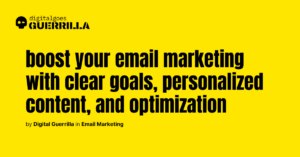Email marketing remains one of the most effective tools for connecting with audiences and driving conversions. However, many businesses struggle to stand out in crowded inboxes or personalize at scale. Enter artificial intelligence (AI). Beyond automating mundane tasks, AI has revolutionized how marketers create, personalize, and optimize email campaigns, offering capabilities that were unimaginable a few years ago.
This guide delves deep into how AI can transform your email marketing strategy, providing actionable insights and advanced techniques to ensure your campaigns are both impactful and efficient.
Why AI in Email Marketing is a Game-Changer
Traditional email marketing relies heavily on human intuition and basic automation. While these methods can be effective, they often fall short in delivering hyper-personalized experiences or adapting in real-time to recipient behaviors. AI bridges these gaps by analyzing vast amounts of data to uncover trends, predict outcomes, and execute personalized campaigns at scale.
Common Pitfalls of Non-AI Email Campaigns
- Over-generalized content that doesn’t resonate with diverse audience segments.
- Missed opportunities for personalization due to time or resource constraints.
- Static email designs that fail to adapt to recipient preferences or behaviors.
With AI, these challenges become opportunities. Let’s explore how to leverage AI to elevate your email marketing game.
The AI Toolkit for Smarter Email Marketing
What are the essential elements of an effective email marketing campaign? AI tools can enhance every stage of the email marketing lifecycle, from content creation to performance analysis. Here are the key areas where AI makes the biggest impact:
1. Hyper-Personalization at Scale
AI excels at analyzing user data, such as browsing habits, purchase history, and engagement patterns. Tools like Dynamic Yield and Optimove enable marketers to segment audiences with unparalleled precision and tailor content to individual preferences.
- Example: Instead of sending a generic product announcement, use AI to highlight products a user recently browsed or complementary items to their previous purchases.
2. AI-Powered Subject Line Optimization
Crafting the perfect subject line can make or break your campaign. AI tools like Phrasee and Persado analyze past performance data to generate subject lines that maximize open rates. These tools can predict recipient reactions to different word choices, lengths, and tones.
- Actionable Tip: Run A/B tests with AI-generated subject lines to continuously refine what resonates with your audience.
3. Behavioral Prediction for Timing
Knowing when to send an email is as important as the content itself. AI tools such as Seventh Sense and Send Time Optimization (STO) in platforms like Mailchimp analyze user activity to predict the optimal send time for each recipient.
- Example: Instead of a one-size-fits-all send time, your email could reach one recipient at 8 AM when they typically check their inbox and another at 7 PM during their evening scroll.
4. Automated Content Creation
AI-driven tools like Jasper and Copy.ai assist in creating email copy that aligns with your brand voice while being highly engaging. By analyzing past content performance, these tools can suggest headlines, CTAs, and body text tailored to your audience.
- Pro Tip: Use AI-generated templates as a starting point but refine them with a human touch to maintain authenticity.
5. Interactive and Dynamic Emails
AI can help create dynamic email content that changes based on real-time factors. For instance, tools like Movable Ink enable interactive elements such as countdown timers, live inventory updates, or personalized product recommendations.
Advanced Strategies to Take AI Email Marketing Further
Leverage Predictive Analytics for Better Segmentation
AI doesn’t just segment based on past behavior—it predicts future actions. Use tools like Bluecore to group users by likelihood to convert, lapse, or upsell, and tailor campaigns accordingly.
- Example: Predict which users are at risk of churn and send a re-engagement email with a personalized discount or offer.
Utilize Natural Language Processing (NLP) for Sentiment Analysis
NLP algorithms can analyze customer feedback, email replies, or survey responses to understand sentiment. Tools like MonkeyLearn can help you fine-tune messaging for recipients who have expressed dissatisfaction or delight with your brand.
Combine AI with Emotional Triggers
AI can help identify emotional triggers that resonate with your audience. Tools like Persado analyze millions of emotional responses to craft emails that drive action, whether it’s excitement, urgency, or trust.
Now you have an idea how to start implementing AI in your email marketing efforts. You might also want to check how to build and grow an email subscriber list and for later stages how to improve email deliverability rates.
Actionable Steps to Implement AI in Your Email Marketing
- Audit Your Current Process: Identify bottlenecks or areas where personalization, timing, or content quality could improve.
- Choose the Right Tools: Research AI platforms tailored to your needs. Start with free trials to explore capabilities before committing.
- Train Your Team: Ensure your team understands how to use AI tools effectively. Most platforms offer tutorials or training resources.
- Set Clear Goals: Define KPIs to measure AI’s impact, such as open rates, click-through rates, or conversion rates.
- Test, Analyze, and Iterate: AI thrives on data. Continuously refine your approach based on performance insights.
FAQs: Common Questions About AI in Email Marketing
Q1: Can small businesses afford AI tools?
Yes, many AI email marketing tools are affordable and scalable. Platforms like Mailchimp and HubSpot offer AI features even in basic plans.
Q2: Do I need technical skills to use AI tools?
Most tools are user-friendly and require minimal technical expertise. However, understanding data analytics can enhance results.
Q3: Is AI replacing marketers?
No. AI is a tool to enhance marketers’ capabilities, not replace them. The human touch remains critical for creativity and strategy.
Conclusion: Transform Your Email Marketing with AI
AI is no longer a futuristic concept—it’s a practical solution for marketers seeking to elevate their email campaigns. By leveraging AI for personalization, timing, and analytics, you can create more engaging emails that drive results. Start small, experiment with tools, and continuously refine your strategy.




